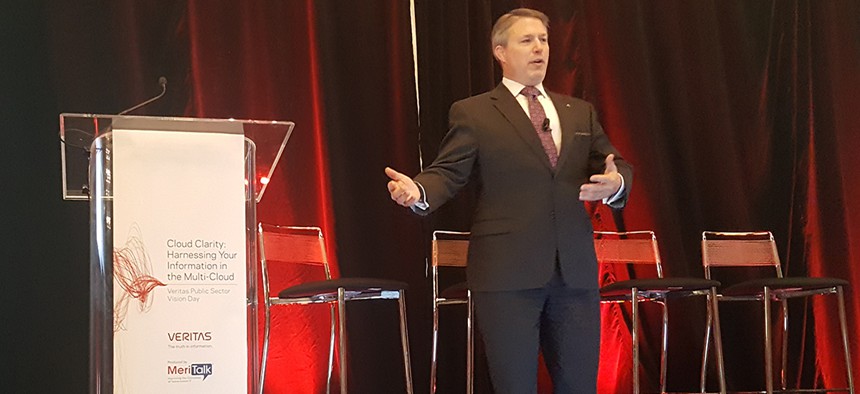sponsor content What's this?
USDA’s Sheridan: Cloud Is the Way Out of Infrastructure ‘Death Spiral’

Presented by
FedTech

The CIO of the Agriculture Department’s Risk Management Agency believes the cloud can revolutionize the federal IT work model.
The modern office in the federal government is not the same as it was in 1830. Yet the model of work that defined the Industrial Revolution still persists, according to Chad Sheridan, the CIO of the Risk Management Agency at the Agriculture Department.
Sheridan, speaking at MeriTalk’s “Cloud Clarity: Harnessing Your Information in the Multi-Cloud” event on March 15 in Washington, D.C., noted that in the past being physically present and knowing the exact scope of the job were the key factors in the model for work, especially for physical labor such as building a ship.
The federal IT model has evolved along these lines and has resulted in siloed environments in which pockets of value are created by servers in data centers devoted to one specific project, Sheridan noted. That model does not deliver for the agency and results in lots of overhead, with dedicated servers, program managers and cybersecurity leads all tied to specific projects.
“It makes us slow to pivot,” he said. “And it gets us caught in this never-ending death spiral for infrastructure.” Agencies need to embrace the cloud to get out of the death spiral, Sheridan argued. He noted that the Technology Modernization Fund enabled by the Modernizing Government Technology Act is an opportunity for agencies to shift to the cloud.
The USDA has formed its own cloud Center of Excellence team and is trying to convince the federal CIO Council to endorse it, Sheridan said, and link it to the governmentwide cloud CoE the General Services Administration is running (which will be tested at the USDA first).
Few Incentivizes to Modernize Federal Data Centers
Sheridan argued that agencies are “in trouble” because they do not have the threat of competition or loss of customers to incentivize them to change their models of work — and models of data center construction: siloed programs, racks of servers and lots of overhead costs.
While there are clear mandates like the Data Center Optimization Initiative, which encourages agencies to make data centers more efficient, Sheridan said that agencies do not face the same pressures that private companies do. “It is unlikely that we are going to disappear as government entities because we didn’t embrace digital photography,” he said, referring to Kodak. If agencies get their appropriations, they consider it a success, Sheridan said.
USDA is aiming to cut the number of data centers it operates from 39 down to two. “Is two too many?” Sheridan asked. “Should the government be in the business of running data centers?”
Data centers can get agencies caught in infrastructure “death spirals” for two reasons, according to Sheridan. Running a data center is an operational task in nature, focused inward. Invoking the second law of thermodynamics, Sheridan noted that “entropy only increases.” In a data center environment, the longer it is maintained, the more chaos and disorder will increase, he argued.
Secondly, Sheridan noted that there is little incentive to innovate inside federal data centers. The best that a network or storage administrator can do running a data center is not get yelled at, Sheridan said. “I deliver the service and they are not going to notice,” he said. “The best I can do is break even.”
Federal data centers cannot hire the best talent or compete with the private sector for pay, training or the opportunity to work on innovative projects, Sheridan noted. “I will always lose,” he said. “Why am I fighting this fight?”
The answer: head to the cloud.
MGT Act Could Spur More Cloud Adoption
Sheridan noted that it has been more than seven years since the government adopted a “cloud first” policy, and that while there has been migration to cloud services, adoption has been “not exactly stellar.”
There have not been enough incentives to get agencies to make the shift, Sheridan argued. “If I am a business leader in an agency, tell me what my incentive is to move infrastructure to cloud,” he said. “It’s not clear what the benefit is. It looks like a big infrastructure project.”
While that is not the only reason for relatively slow adoption, Sheridan argued it is a key one. However, the MGT Act’s pool of money — potentially up to $250 million this fiscal year and next — to get modernization projects funded via the central fund, could be a clear opportunity for cloud migrations “that we know will get us out of that death spiral.”
It is not going to be a “panacea,” Sheridan said. “It isn’t necessarily going to give us that win that is going to solve world hunger yesterday, but it’s a start,” he said.
Cloud — whether Infrastructure, Platform or Software as a Service — will allow agencies to move from an idea of project management to product management, Sheridan said. “It gives us the opportunity to start and run our business in an operational expense manner, which leads us to the opportunity of productizing our workflow,” he said.
If agencies can use predictable cloud pricing to predict the operational expenses of their IT infrastructure, they can deliver new services in a more predictable way, he said. Instead of approaching a big IT project such as a new customer experience portal as something the agency will complete as a mammoth project over 18 months, Sheridan argued, the cloud enables agencies to predict when they will be able to deliver certain products (and the size of those products) that are part of that larger portal project.
Cloud allows agencies to predict the cost of their infrastructure and development, which then allows them to predict how many products they can deliver per quarter or every month. Cloud, Sheridan said, lets agencies plan in increments and release products at any time, something that is not novel in the private sector. “I’m not worrying about buying servers,” he said. “I can surge capacity if I need it.”
USDA is working to get the CIO Council to endorse the grassroots effort the agency has made with its internal cloud CoE and connect it to the GSA-run cloud CoE, Sheridan said. “People put their blood, sweat and tears into it,” Sheridan said, and he hopes the CIO Council will endorse the effort in the next few months.
This content is made possible by FedTech. The editorial staff of Nextgov was not involved in its preparation.





